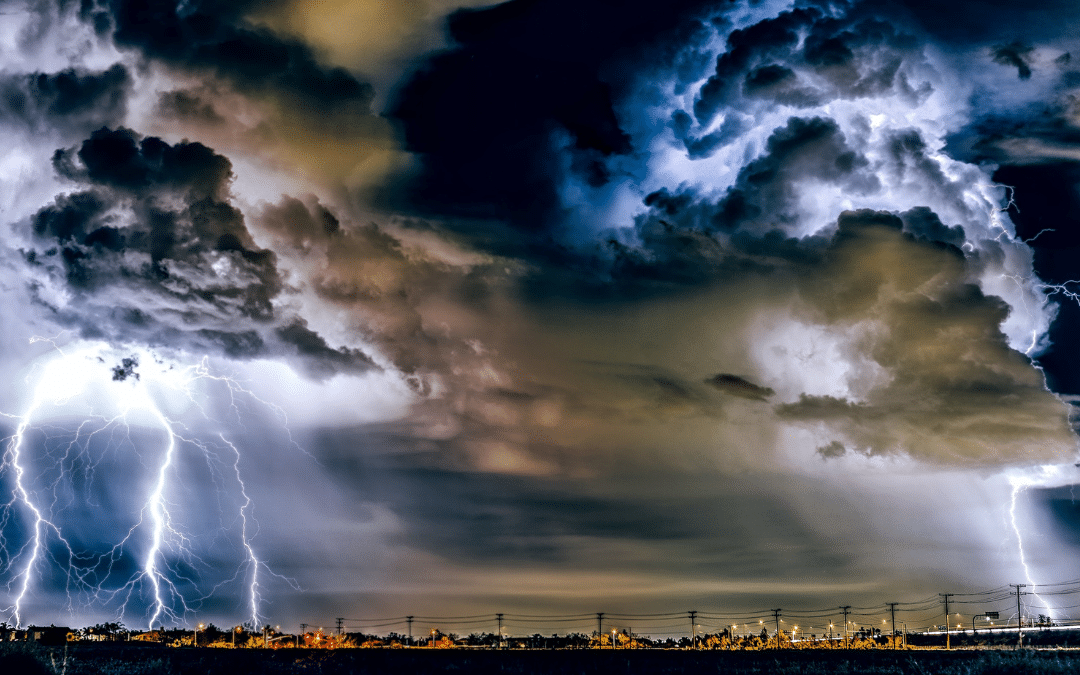
by California Casualty | Homeowners Insurance Info, Safety |
Unpredictable weather is a trademark of spring: 73° and deliciously sunny one day, 41°, and sideways rain the next.
Fluctuating weather during this time of year also plays a major factor in the development of severe spring storms. However, with the right preparation, you can be sure that your home and family are ready to withstand the worst of it.
Follow these preparation tips to be sure you are spring storm-ready.
Be Weather Aware — You can sign up for a number of free weather alert services provided by national or local agencies, weather channels, and power companies. Usually, alerts come to your phone via text message or app, but many have multiple delivery methods. And remember, radio is the old standby, especially in a power outage (so set your emergency radio to the correct station ahead of time).
Trim the Trees — Trim low-hanging limbs, as well as any branches hanging near your home or power lines that could snap off in high winds and cause damage.
Free Your Gutters — Remove leaves and other debris from gutters, drains, and downspouts (best done each spring and fall). This ensures that any deluge of rainwater is quickly diverted away from your home and foundation rather than potentially flooding it. Take the opportunity to check gutters for leaks, damage, and sagging; also make sure they’re securely attached.
Check the Sump Pump — If you haven’t had to deal with a flooded basement, thanks are due to your hardworking sump pump. To keep it in good working order, test it a few times a year, including before spring storms. Clear any debris and make sure it’s working and draining properly. Consider adding a battery-powered back-up pump, or a standby generator, in case of power outages.
Get Ahead of Leaks — Leaks are sneaky … and can cause damage quickly. If you’ve had any leaks in the past, now’s the time to seal them up—before the big rains start. Also do a preventive check on your doors’ and windows’ sealing (inside and outside), as well as in the garage and basement, then fix any gaps or cracks.
Secure Items — By the time the wind is bending trees, it’s too late to worry about securing items in your yard. As soon as storms are forecast, bring items like patio furniture into the garage (or secure them in place outside). Anything that can become a projectile should be moved inside. Also close and secure shutters around your home. Drawing interior blinds and shades provide yet another layer of protection against flying debris and broken glass.
Get Your Plans in Place — When the storms roll in, you’ll be glad you made plans ahead of time.
-
- Storm Safety Plan — Create a safety plan with your family, and make sure everyone understands it and is on board. This would cover things like shelter-in-place locations in the home, evacuation routes, communication protocols if you’re separated, and a plan for your pets.
- Emergency Kit — Regularly check your kit and add, replace or discard items as needed. See our checklist here for a full emergency kit inventory. At the very least, prepare the following for storms: first aid supplies, flashlights with new batteries, two gallons of water per person, a hand-crank or battery-powered radio, a three-day supply of non-perishable food for your family and pets, and a two-month supply of any necessary medications.
- Be Ready for a Power Outage — Are you ready for a few days of no power? Charge all phones and electronic devices ahead of time. Make sure your generator is operational and ready to go. Fill your car’s gas tank (and some cans for your generator). For more tips, check out our power outage safety hacks. Finally, remember to use surge protectors when the power is being restored.
As the saying goes, “An ounce of prevention is worth a pound of cure.” When it comes to safeguarding your home, the steps above can go a long way toward preventing costly damage, headache, and hassle. And there’s no time like the present to start!
This article is furnished by California Casualty, providing auto and home insurance to educators, law enforcement officers, firefighters, and nurses. Get a quote at 1.866.704.8614 or www.calcas.com.

by California Casualty | Health, Safety |
About half of all Americans have been financially affected by the coronavirus. Many have lost jobs or are dealing with reduced hours, and those still working might be anxious about what’s on the horizon. Lean times—even the possibility of them—call for fiscal prudence.
Here are some tips to cut costs and put yourself and your family on better financial footing.
Evergreen Principles
These tips are wise moves in any economy, but especially important right now.
-
- Revise your budget. Depending on your family’s situation, your income and expenses might look very different from just a few months ago. Review with fresh eyes how much money is coming into and out of your household.
- Cut the fat. What are your essential expenses? For most people, it’s rent/mortgage, groceries, loans, and utility payments. For all other expenses, reassess what you really need—and don’t be afraid to make cuts.
- Lower your energy bill. Adjusting your thermostat just a few degrees can translate to dollars saved. Also, check your doors and windows for easy-to-fix gaps that may be leaking air.
- Consolidate your entertainment. Streaming services and subscriptions can add up quickly. Only keep those you use; and turn off “auto-renew.” Cutting your cable can also mean big savings.
- Check cell phone & internet bills. Your plans may have add-ons (extra data, faster speed, etc.) that you’ve forgotten about or don’t need. Ditch those, and then call to change or negotiate your plan—and don’t be afraid to switch providers (many will lower your bill to keep your business).
- Get smart on groceries. Plan meals ahead of time to reduce impulse buys at the store. Make large meals (soups, stews, salads) in big batches to last for days. Vegetarian meals are especially budget-friendly. Also, look at your food waste—and use what you buy.
Made for These Times
Sometimes crises come with opportunities; in the case of coronavirus, there are some new ways to save.
-
- Coronavirus resources. The federal assistance available to those impacted by coronavirus includes resources for unemployment, healthcare, loans, stimulus checks, and business aid. Check the site to see if you’re eligible.
- Free subscriptions. Many digital platforms are offering free subscriptions right now. From streaming services and educational programs to online workouts, you can find a lot just by doing a web search.
- Low refinance rates. The Federal Reserve’s recent slashing of the interest rate translates to very low rates on loans. If you were considering refinancing your mortgage or another large loan, this might be a great time.
- Lower debt interest. Federal student loan interest (along with principal) has been suspended until September 30, 2020. Check with your other creditors to see if they will work with you to lower your interest rate or temporarily suspend it.
- Eviction, rent, and mortgage protection. Due to widespread hardship, there are assistance programs available for rent and mortgage payments, as well as protection against eviction. Check your state’s programs and the Federal website.
- Summer Skip option. Educators who are California Casualty policyholders can opt to take a break from premium payments during the summer months.
If you’re able to, pad your healthcare and emergency savings as much as possible. If you’re expecting a tax refund (tax day has been extended to July 15), try to stash that in savings.
Hopefully, the lean times will be temporary, but you’ll never regret saving money where you could.
This article is furnished by California Casualty, providing auto and home insurance to educators, law enforcement officers, firefighters, and nurses. Get a quote at 1.866.704.8614 or www.calcas.com.

by California Casualty | Auto Insurance Info, Safety |
If you have a teen who will be driving soon, consider taking advantage of this extra time at home and teaching them the rules of the road. Preparation and knowledge always make a safer driver, and this extra time means your teen can learn in a no-rush environment and absorb the material at their own speed.
Remember that you have more influence on your teen than you may think. Share your driving experiences with them—lessons learned, close calls, even your mistakes. Stress safety as the top priority, always.
Here’s how you can prep your young driver for the road.
The Rules of the Road
The first step is for them to become familiarized with the basic laws and rules of driving. Look into driver education courses online. Classes are interactive and teach traffic laws, safe driving techniques, and the dangers and risks of the road.
Your state’s DMV website should also have plenty of resources, such as driver handbooks, driving tutorials, and sample written tests.
Tour the Vehicle
To help your teen get a feel for the vehicle, take them through all the features and controls—both inside and outside the car. First, inside:
-
- Location of owner’s manual, registration and insurance card
- Dashboard controls
- Windshield wipers
- Seat belts, airbags, and other safety features
- Steering wheel & seat adjustment
- Headlights, low beams, fog lights, and high beams
- Turn signals
- Emergency/parking brake
- Gas and brake pedals (and ABS)
- Cruise control
- Mirrors — location & adjustments
- Emergency lights & warning indicator lights
- Ignition
Next, take a tour around the outside of the vehicle:
-
- Overview of the engine, including the battery and 5 important fluids (engine oil, coolant, power steering fluid, brake fluid, and windshield washer fluid)
- Tires — reading PSI and correct inflation
- Location of safety items such as spare tire, jack, jumper cables, chains and emergency roadside kit (bonus: teach them how to change a tire)
- Taillights & brake lights
Remember to also explain things such as vehicle maintenance schedules (check the owner’s manual), safety ratings, and what to do in roadside emergencies.
Go for a Spin
If your teen has done well on the above, has a learner’s permit, and is covered by your insurance, it might be time for them to start practicing (depending on your city’s current stay at home orders).
Although streets should be relatively quiet, start first in a large, empty parking lot. Be sure to give directions in a clear, calm voice, and well in advance. Answer questions calmly and informatively. Give your teen time to learn at a comfortable pace. Take your time and gradually increase driving practice time.
Your state’s DMV should have lesson plans online for practice sessions. But in general, lessons start with the basics of starting the vehicle, making adjustments to controls, moving forward, stopping, backing up and turning, before moving on to lane changes, intersections, and practicing in traffic. Advanced lessons include parallel parking, freeway driving, and parking on hills.
Take the Pledge
Teen drivers are involved in more collisions than any other age group. Risk factors include distracted driving, risky behaviors behind the wheel, driving inexperience, and lack of maturity.
You can reinforce the responsibility and privilege of safe driving by signing a safe driving contract with your teen (samples here and here). You can also lead by example by joining your teen in taking a pledge against distracted driving: sign up for the National Safety Council’s Just Drive campaign or California Casualty’s Keep on Course campaign.
This article is furnished by California Casualty, providing auto and home insurance to educators, law enforcement officers, firefighters, and nurses. Get a quote at 1.866.704.8614 or www.calcas.com.

by California Casualty | Auto Insurance Info, Safety |
While we’ve all had some extra time at home to tidy up our houses and yards, we can’t forget about our vehicles! It feels like forever since we’ve been out on the road, and we’ve really missed our cars. Although we aren’t driving nearly as often right now, we will be soon, and that is why it is important to make sure our cars are clean and running properly.
Make sure your car is in prime condition for the next time you are behind the wheel by following our interior and exterior Spring Cleaning Car Care Checklist:
Cleaning the Interior
- Remove Trash: Cars fill up quickly when you have kids and are always on the go; receipts, water bottles, wrappers, etc. Make sure the first thing you do is pick up all of the trash on the inside and place a bag that can serve as a trashcan for the next time you have to throw something away.
- Shake out Mats: Remove all large pieces of trash or debris from the floor mats of your car. After, take all of the mats out of your car and shake them out in an open area, and then lay them in a clean spot. To make cleaning easier in the future, look into purchasing heavy-duty rubber mats.
- Clean Vents and Ducts: The best way to do this is with pressurized air, but if you don’t have it you can use a dusting cloth or a wet wipes
- Vacuum: Try and get every part of your vehicle that you can, this includes floorboards, seats, under the seats, trunk, cup holders, and any other space that is large enough. Don’t forget to vacuum the floor mats before putting them back in your car as well.
- Organize: If you have certain items that you keep in your car at all times, like blankets, umbrellas, chairs, sports equipment, reusable shopping bags, coolers, etc. Take these out, make sure each item is clean and has a special place that will not cause clutter or take up too much space when you put it back in your car after it’s been vacuumed. Placing organization bins in your trunk can help out with this.
- Wipe Down: Use a wet wipe or dusting cloth to clean and wipe down your dash, front console, and anywhere else that dirt can hide. And then if you would like to go an extra step you can detail your dash by using a microfiber cloth and some polish or dashboard wipes to make your steering wheel and dash shine.
- Change Air Freshener: After your car is clean from top to bottom change out your air freshener to a nice spring scent and you are good to go!
Now that your car is clean on the inside, it’s time to make sure everything is up and running properly on the outside.
Cleaning & Checking the Exterior:
- Get an Oil Change: You should change your oil about every 5,000 miles depending on the year, make, and model of your vehicle and your own personal driving habits. This will help keep your engine clean and running properly.
- Check the Air Filter: Air filters should be changed at least every 15,000 miles. Air filters are inexpensive and will help you increase your gas mileage, reduce emissions, and allow more air to flow to your engine to help it run smoothly and prolong it’s life.
- Check Your Tires: If a car has been sitting for long periods of time, especially in colder weather, pressure can slowly leak out of your tires, so it is important to check your air pressure and make sure you have the right amount. While you are checking the pressure look at the tread on your tires, if it is low consider getting new tires altogether.
- Buy New Wipers: Spring is rainy season for most of the US, and when you are driving in the middle of a spring storm, it is important that your windshield wipers do their job. You should replace them once a year, so spring is the perfect reminder.
- Go Through the Car Wash: Dust, mud, pollen, bugs, and rain residue are all commonly found on cars in the spring. Make your car look shiny and new by taking it through the car wash and getting a polish or by giving it your own wipe down at home! Pro tip: don’t forget the tires!
Drive safe!
This article is furnished by California Casualty, providing auto and home insurance to educators, law enforcement officers, firefighters, and nurses. Get a quote at 1.866.704.8614 or www.calcas.com.

by California Casualty | Health, Safety |
Stress is a normal part of life; however, the anxiety caused by Coronavirus may be a new level of stress, many of us have never dealt with before. We’re having to navigate life in a way in a completely new way; working from home, schooling from home, and isolating ourselves from one another. All while not knowing what a day, a month, or a year might bring.
Some of us are slowly figuring out the “new normal”, while others seem to be having a harder time figuring out how to adjust. Thankfully, there are some simple strategies you can use at home to relieve stress and help get you through these tough times.
Here are some easy ways you and your family can combat stress & anxiety caused by COVID-19.
Exercise
Exercise increases your body’s production of endorphins (those feel-good hormones that can improve your mood). Any kind of physical movement will work. Take a short walk, do some chores around the house, or pop on a workout video.
If you are looking for fun exercises for your kids to try, we have a guide here that is full of YouTube channels that will get your child up and moving!
Consume Healthy Foods
It’s no secret that eating well is hard to do when you’re stressed. When we get stressed, our bodies produce the hormone cortisol, which can cause us to crave fats and sugars. Try keeping a variety of fruits, veggies, and nuts at the ready in the event of a snack attack. The more nutritious the food, the more energy your body will receive and the better you will feel.
Take a Bath
Stress can cause tense muscles. A hot bath loosens muscles while also providing a relaxing atmosphere. Light a candle and pour some bubble bath and relax.
If baths aren’t your thing, consider deep stretching or a massage (ask someone you live with to help you with this one).
Stretch Your Funny Bone
Laughter is the best medicine. According to the Mayo Clinic, laughing can stimulate your organs, activate your stress relief response, and soothe tension. There is also evidence that laughter can improve your immune system, relieve pain, increase personal satisfaction, and improve your mood. So, what are you waiting for? Tell some cheesy jokes, watch a funny movie, have a family game night, or read a fun book.
Put it Down on Paper
Journaling your thoughts is cathartic. Let the juices flow, write whatever you are thinking, no need to worry about grammar or technical errors. When you’re done, you may choose to keep your writing to revisit later or toss it.
Many parents have also encouraged their children to keep daily journals during this time, so they can easily look back when they are older and remember how their day-to-day lives completely changed. When you read over their journal entries you can also get a better sense of how your child is coping.
Try Meditation
Create a sense of calm for your body and mind through meditation. There are many forms of mediation, like visualization, deep breathing, and even guided meditation. You can find a variety of free meditation apps, websites, and videos by just simply Googling, “Free Meditation”.
Get Your Beauty Rest
Loss of sleep causes stress on your body. Sleeping recharges your body and your brain. Stick to a consistent bedtime routine that helps you to wind down before slipping under the covers. No devices or caffeine before bed.
While it is important to rest, it is also just as important to not over-rest. To function at your best level, try and get 7-9 hours of sleep per night.
Stay Connected
Even in the midst of a global pandemic requiring many cities and states to enact stay-at-home orders, we can still connect with family and friends through technology. Using virtual meeting platforms and video chat apps, we can spend valuable face time with loved ones and friends thanks to technology like WhatsApp, Skype, Houseparty, Google Hangouts Meet, Zoom, FaceTime.
Talking on the phone and sending/receiving letters can also fulfill this need for human interaction.
Find a Hobby
Distract yourself with an enjoyable activity. Maybe you pick up a new hobby, or you rediscover a love for a hobby you once adored like, sewing, playing an instrument, jewelry making, painting, DIY projects, baking, making TikTok videos, reading, gardening, working out, or even adopting a shelter pet and training it.
Either way, keeping your mind occupied with something you love can keep the stress at bay. You might even consider sharing your hobby with a friend or loved one.
Seek Professional Help
If you’ve tried coping with stress on your own, but are still having trouble kicking stress to the curb, it might be time to seek the help of a professional.
Mental health professionals can help you determine what triggers your stress. They can also assist you in developing a plan for coping by providing you with tools to fit your needs.
For more information visit:
www.apa.org
www.mayoclinic.org
This article is furnished by California Casualty, providing auto and home insurance to educators, law enforcement officers, firefighters, and nurses. Get a quote at 1.866.704.8614 or www.calcas.com.

by California Casualty | Nurses, Safety |
Nurses, doctors, and health care professionals are our frontline heroes in the fight against coronavirus. With almost 4 times as many nurses as physicians in the U.S. (3.8 million vs 1.1 million, respectively), nurses are the largest segment of providers seeing, treating, comforting and providing ongoing care for the patients that are and will continue coming into hospitals and clinics.
Nurses know they will be hit hard, yet they are stepping up heroically in the face of incredibly long hours, heartbreaking care cases and increased personal risk. So, it’s time for the rest of us to step up and support them by doing our part to keep our healthcare workforce strong, healthy and resilient, we can help turn the tide on the crisis.
Here’s how you can help nurses in your community.
Stay Home
Across the country, various forms of shelter-in-place and social distancing orders have gone into effect. The basic idea is that by limiting exposure to others, we can significantly limit the spread of coronavirus infections. That will help us “flatten the curve” and prevent our hospitals from getting swamped beyond capacity. What you do matters. Stay updated on your city’s instructions by visiting its website, TV channel or social media channels.
Donate Supplies
Many facilities are in need of gloves, goggles, N95 masks, disinfectant wipes, hand sanitizer, gowns, and other PPE. Look through your closets and garage and see if you’ve got extras (new and unused) you can donate. Check your local news pages, public health agencies or health care provider’s social media pages for specific needs and drop off instructions. Some are even asking crafters to sew masks!
Follow the Care Protocol
If you feel you might be sick, contact your doctor or advice nurse about your symptoms, then follow their instructions. Given the pressure on the health system, they are working hard to provide high-quality, personalized care to their insureds via telehealth, while also ensuring that high-risk and vulnerable patients have access to emergency and hospital services. And if you haven’t done so already, cancel or postpone any elective or routine care appointments.
Be a Good Neighbor
Many of us know nurses and health care workers personally. Whether they’re in your family, friend circle or neighborhood, make a point to reach out (virtually) and check-in. See if there’s anything you can do for them or their families. This could be something like picking up groceries, walking their dog or picking up their takeout. They are and will continue to be overwhelmed—physically, mentally and emotionally. Let them know you’re there for them.
As nurses and other healthcare professionals treat more and more patients, their risk of infection increases. That’s a real danger—both to their own personal health and to the number of providers that will be available to take care of patients in the months ahead.
Never in our modern lives have our personal choices made such an impact on the health of our greater community, that is why it is so important that you help do what you can today.
This article is furnished by California Casualty, providing auto and home insurance to educators, law enforcement officers, firefighters, and nurses. Get a quote at 1.866.704.8614 or www.calcas.com






